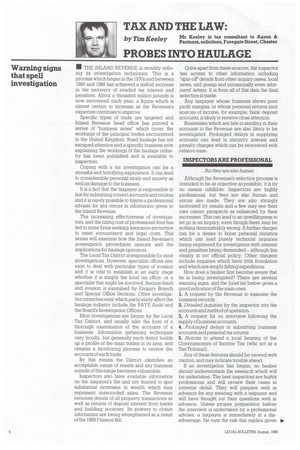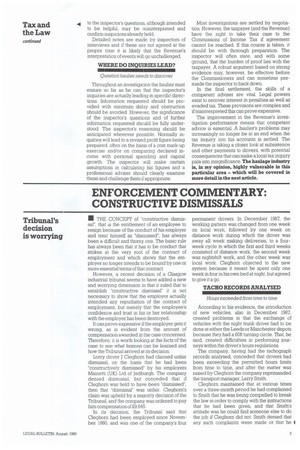TAX AND THE LAW:
Page 96

Page 97

If you've noticed an error in this article please click here to report it so we can fix it.
by Tim Keeley
Mr Keeley is tax consultant to Aaron & Partners, solicitors, Foregate Street, Chester
PROBES INTO HAULAGE
• THE INLAND REVENUE is steadily refining its investigation techniques. This is a process which began in the 1970s and between 1980 and 1988 has achieved a sixfold increase in the recovery of evaded tax interest and penalties. About a thousand million pounds is now recovered each year, a figure which is almost certain to increase as the Revenue's expertise continues to improve.
Specific types of trade are targeted and Inland Revenue head office has printed a series of "business notes" which cover the workings of the principal trades encountered in the United Kingdom. Road haulage has not escaped attention and a specific business note explaining the workings of the haulage industry has been published and is available to inspectors.
Coping with a tax investigation can be a stressful and horrifying experience. It can lead to considerable personal strain and anxiety as well as damage to the business.
It is a fact that the taxpayer is responsible in law for submitting correct accounts and returns and it is rarely possible to blame a professional adviser for any errors in information given to the Inland Revenue.
The increasing effectiveness of investigators, and the rising cost of professional fees has led to some firms seeking insurance protection to meet accountancy and legal costs. This series will examine how the Inland Revenue's investigation procedures operate and the implications for haulage operators.
The Local Tax District is responsible for most investigations. However, specialist offices also exist to deal with particular types of evasion and it is vital to establish at an early stage whether it is simply the local tax office, or a specialist that might be involved, Serious fraud and evasion is examined by Enquiry Branch and Special Office Sections. Other investigation branches exist which particularly affect the haulage industry include the PAYE Audit and the Board's Investigation Offices.
Most investigations are begun by the Local Tax District, and usually take the form of a thorough examination of the accounts of a business. Information gathering techniques vary locally, but generally each distict builds up a profile of the main trades in its area, and creates a monitoring process to review the accounts of each trade.
By this means the District identifies an acceptable range of results and any business outside of this range becomes vulnerable.
Inspectors also have available information on the taxpayer's file and are trained to spot substantial increases in wealth which may represent unrecorded sales. The Revenue receives details of all property transactions as well as returns of deposit interest from banks and building societies. Its powers to obtain information are being strengthened as a result of the 1989 Finance Bill. Quite apart from these sources. the inspector has access to other information including "spin-off' details from other inquiry cases, local news, and gossip and occasionally even informers' letters. It is from all of this data the final selection is made.
Any taxpayer whose business shows poor profit margins, or whose personal returns omit sources of income, for example, bank deposit accounts, is likely to receive close attention.
Businesses which are late in sending in their accounts to the Revenue are also likely to be investigated. Prolonged delays in supplying accounts can lead to statutory interest and penalty charges which can be recovered with relative ease.
INSPECTORS ARE PROFESSIONAL
But they are also human Although the Revenue's selection process is intended to be as objective as possible, it is by no means infallible. Inspectors are highly professional, but they are also human and errors are made. They are also strongly motivated by results and a few may see their own career prospects as enhanced by their successes. This can lead to an unwillingness to let go in an inquiry, even though there may be nothing demonstrably wrong. A further danger can be a desire to boost personal statistics which can lead purely technical inquiries being registered for investigation with interest and penalties being demanded — although this clearly is not official pohcy. Other dangers include inquiries which have little foundation and which are simply fishing expeditions.
How does a haulier first become aware that he is being investigated? There are several warning signs, and the brief list below gives a good indication of the main ones.
1. A request by the Revenue to examine the business records.
2. Detailed inquiries by the inspector into the accounts and method of operation.
3, A request for an interview following the supply of business accounts.
4. Prolonged delays in submitting business accounts and personal tax returns.
5. Notices to attend a local hearing of the Commissioners of Income Tax (who act as a Tax Tribunal).
Any of these features should be viewed with caution, and may indicate trouble ahead.
If an investigation has begun, no haulier should underestimate the research which will be undertaken. The best inspectors are highly professional and will review their cases in extreme detail They will prepare well in advance for any meeting with a taxpayer and will have thought out their questions well in advance. Unless proper preparation before the interview is undertaken by a professional adviser, a taxpayer is immediately at a disadvantage. He runs the risk that replies given • 4 to the inspectors questions, although intended to be helpful, may be misinterpreted and confirm suspicions already held.
Detailed notes are made by inspectors of interviews and if these are not agreed at the proper time it is likely that the Revenue's interpretation of events will go unchallenged.
WHERE DO INQUIRIES LEAD? Question haulier needs to discover Throughout an investigation the haulier must ensure so far as he can that the inspector's inquiries are actually leading in specific directions. Information requested should be provided with minimum delay and obstruction should be avoided. However, the significance of the inspectors questions and of further information requested should be fully understood. The inspector's reasoning should be anticipated wherever possible. Normally inquiries will lead to a revised profit figure being prepared, often on the basis of a cost mark-up exercise and/or on comparing declared income with personal spending and capital growth, The inspector will make certain assumptions in calculating his figures and a professional adviser should clearly examine these and challenge them if appropriate. Most investigations are settled by negotiation. However, the taxpayer (and the Revenue) have the right to take their case to the Commissions of Income Tax if agreement cannot be reached. If this course is taken, it should be with thorough preparation. The inspector will often state, and with some ground, that the burden of proof lies with the taxpayer. A robust argument based on strong evidence may, however, be effective before the Commissioners and can sometime persuade the inspector to back down.
In the final settlement, the skills of a competent adviser are vital. Legal powers exist to recover interest in penalties as well as evaded tax. These provisions are complex and if misinterpreted this can prove expensive.
The improvement in the Revenue's investigation performance means that competent advice is essential. A haulier's problems may increasingly no longer be at an end when the tax inquiry into his accounts is settled. The Revenue is taking a closer look at subsistence and other payments to drivers, with potential consequences that can make a local tax inquiry pale into insignificance. The haulage industry Is, in my opinion, highly vulnerable in this particular area — which will be covered in more detail in the next article.




































































































